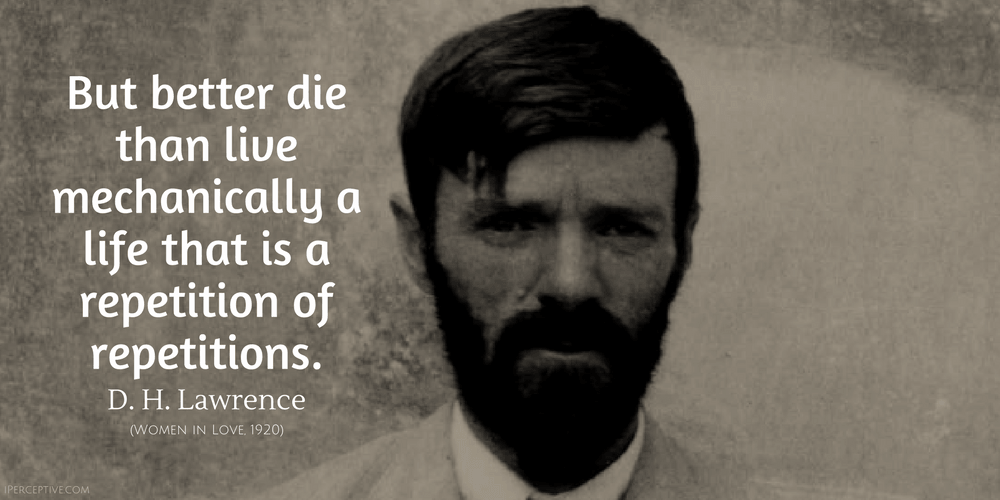D. H. Lawrence Quotes

It is a fine thing to establish one's own religion in one's heart, not to be dependent on tradition and second-hand ideals. Life will seem to you, later, not a lesser, but a greater thing.
D. H. Lawrence (Letter to Ada Lawrence, 1911)
I am in love - and, my God, it's the greatest thing that can happen to a man. I tell you, find a woman you can fall in love with. Do it. Let yourself fall in love, if you haven't done so already. You are wasting your life.
D. H. Lawrence (Letter to Arthur McLeod, 1912)
The great living experience for every man is his adventure into the woman. The man embraces in the woman all that is not himself, and from that one resultant, from that embrace, comes every new action.
D. H. Lawrence (Letter to Bertrand Russell, 1914)
You'll never succeed in idealizing hard work. Before you can dig mother earth you've got to take off your ideal jacket. The harder a man works, at brute labor, the thinner becomes his idealism, the darker his mind.
D. H. Lawrence (Studies in Classic American Literature, 1923)
Life and love are life and love, a bunch of violets is a bunch of violets, and to drag in the idea of a point is to ruin everything. Live and let live, love and let love, flower and fade, and follow the natural curve, which flows on, pointless.
D. H. Lawrence (Essay: Do Women Change)
The source of all life and knowledge is in man and woman, and the source of all living is in the interchange and the meeting and mingling of these two: man-life and woman-life, man-knowledge and woman-knowledge, man-being and woman-being.
D. H. Lawrence (Letter, 1914)
It's no good trying to get rid of your own aloneness. You've got to stick to it all your life. Only at times, at times, the gap will be filled in. At times! But you have to wait for the times. Accept your own aloneness and stick to it, all your life. And then accept the times when the gap is filled in, when they come. But they've got to come. You can't force them.
D. H. Lawrence (Lady Chatterley's Lover, 1928)
Ours is essentially a tragic age, so we refuse to take it tragically. The cataclysm has happened, we are among the ruins, we start to build up new little habitats, to have new little hopes. It is rather hard work: there is now no smooth road into the future: but we go round, or scramble over the obstacles. We’ve got to live, no matter how many skies have fallen.
D. H. Lawrence (Lady Chatterley's Lover, 1928)
I never saw a wild thing
sorry for itself.
A small bird will drop frozen dead from a bough
without ever having felt sorry for itself.
Sanity means the wholeness of the consciousness.
And our society is only part conscious, like an idiot.
D. H. Lawrence (The poem Nemesis)
It seems to me absolutely true, that our world, which appears to us the surface of all things, is really the bottom of a deep ocean: all our trees are submarine growths, and we are weird, scaly-clad submarine fauna, feeding ourselves on offal like shrimps. Only occasionally the soul rises gasping through the fathomless fathoms under which we live, far up to the surface of the ether, where there is true air.
D. H. Lawrence (Lady Chatterley's Lover, 1928)
When we get out of the glass bottles of our ego,
and when we escape like squirrels turning in the
cages of our personality
and get into the forests again,
we shall shiver with cold and fright
but things will happen to us
so that we don't know ourselves.
Cool, unlying life will rush in,
and passion will make our bodies taut with power,
we shall stamp our feet with new power
and old things will fall down,
we shall laugh, and institutions will curl up like
burnt paper.
D. H. Lawrence (The poem Escape)
What man most passionately wants is his living wholeness and his living unison, not his own isolate salvation of his "soul." Man wants his physical fulfillment first and foremost, since now, once and once only, he is in the flesh and potent. For man, the vast marvel is to be alive. For man, as for flower and beast and bird, the supreme triumph is to be most vividly, most perfectly alive. Whatever the unborn and the dead may know, they cannot know the beauty, the marvel of being alive in the flesh. The dead may look after the afterwards. But the magnificent here and now of life in the flesh is ours, and ours alone, and ours only for a time. We ought to dance with rapture that we should be alive and in the flesh, and part of the living, incarnate cosmos. I am part of the sun as my eye is part of me. That I am part of the earth my feet know perfectly, and my blood is part of the sea. My soul knows that I am part of the human race, my soul is an organic part of the great human soul, as my spirit is part of my nation. In my own very self, I am part of my family. There is nothing of me that is alone and absolute except my mind, and we shall find that the mind has no existence by itself, it is only the glitter of the sun on the surface of the waters.
D. H. Lawrence (Apocalypse, 1930)


